
Are you struggling with a vehicle that seems to have endless problems? You might be dealing with a “lemon.” In California, the Lemon Law offers protection for consumers who’ve purchased defective vehicles.
What is Lemon Law?
Lemon Law is a consumer protection measure designed to help car buyers who’ve unintentionally purchased defective vehicles. In California, this law covers both new and used cars that are still under the manufacturer’s warranty. If your vehicle has a significant defect that persists after a reasonable number of repair attempts, you may be entitled to a refund or replacement.
The core purpose of Lemon Law is to ensure that consumers don’t bear the financial burden of a faulty vehicle. It recognizes that sometimes, despite best efforts, manufacturers produce cars with serious defects. When these defects substantially impair the vehicle’s use, value, or safety, and can’t be fixed after multiple repair attempts, the law steps in to protect the consumer.
Key points of California’s Lemon Law include:
- Coverage for new and used vehicles under warranty
- Protection against significant, persistent defects
- Right to a refund or replacement after unsuccessful repairs
- Applies to cars, trucks, SUVs, and some other vehicles
If you’re experiencing ongoing issues with a recently purchased vehicle in California, you might have a Lemon Law case. At Consumer Action Law Group, we can help you determine if your situation qualifies and guide you through the process of seeking resolution. Don’t let a defective vehicle drain your finances – understand your rights under the Lemon Law and take action to protect your investment.
Why is it Called Lemon Law?
The term “Lemon Law” has an interesting history that dates back to early 20th-century slang. Originally, British speakers used the word “lemon” to describe something of poor quality or that didn’t work as intended. This usage crossed the Atlantic, and by the early 1900s, Americans had adopted it to refer to defective products in general.
As automobiles became more common, the term naturally stuck to cars that seemed to have constant problems. The phrase “buying a lemon” became synonymous with purchasing a car that turned out to be unreliable or defective.
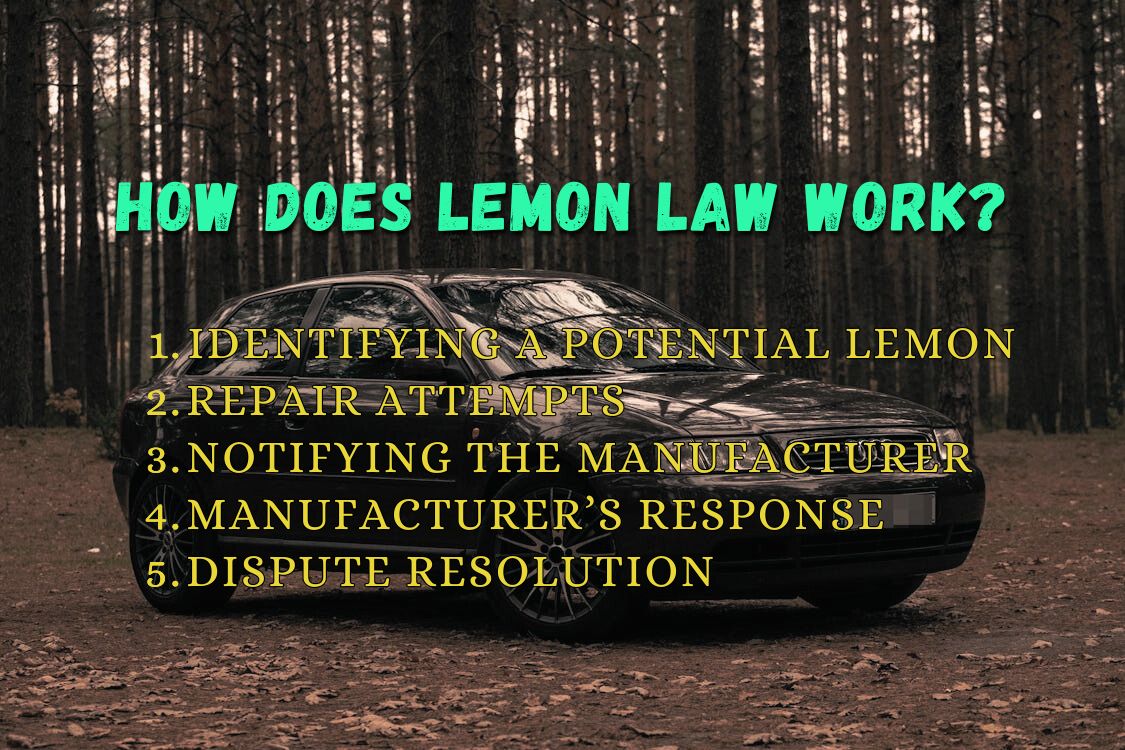
How Does Lemon Law Work?
California’s Lemon Law is designed to be straightforward, but navigating the process can sometimes be challenging. Here’s a basic overview of how it works:
- Identifying a Potential Lemon: If you’re experiencing recurring problems with your vehicle, it might qualify as a lemon. The issues must significantly impact the car’s use, value, or safety.
- Repair Attempts: You must give the manufacturer or dealership a “reasonable” number of attempts to fix the problem. In California, this typically means:
- At least two attempts for issues that could cause serious injury or death
- At least four attempts for other significant problems
- Or, if your car has been in the shop for more than 30 days (not necessarily consecutive) for repairs
- Notifying the Manufacturer: You need to inform the manufacturer about the ongoing issues. It’s best to do this in writing and keep copies of all communications.
- Manufacturer’s Response: The manufacturer should offer to either repair the vehicle, replace it, or provide a refund.
- Dispute Resolution: If the manufacturer doesn’t offer a satisfactory solution, you may need to pursue your claim further. This could involve arbitration or legal action.
Is Your Vehicle Protected Under California’s Lemon Law?
To determine if your vehicle qualifies for protection under California’s Lemon Law, several criteria must be met. Understanding these requirements can help you assess whether you have a valid claim:
- Warranty Coverage: Your vehicle must be under the manufacturer’s original warranty when the defect first occurred. This applies to both new and used vehicles.
- Substantial Defect: The problem must significantly affect your car’s use, value, or safety. Minor issues or normal wear and tear typically don’t qualify.
- Reasonable Repair Attempts: You must have given the manufacturer a fair chance to fix the issue. In California, this usually means:
- At least two attempts for problems that could cause serious injury or death
- At least four attempts for other significant issues
- Or, the vehicle has been out of service for repairs for a total of 30 days or more
- Timeframe: The problems must occur within 18 months of the vehicle’s delivery to you or before 18,000 miles on the odometer, whichever comes first.
- Vehicle Type: The law covers cars, trucks, SUVs, and some RVs. It also applies to the chassis, chassis cab, and drivetrain of a motor home.
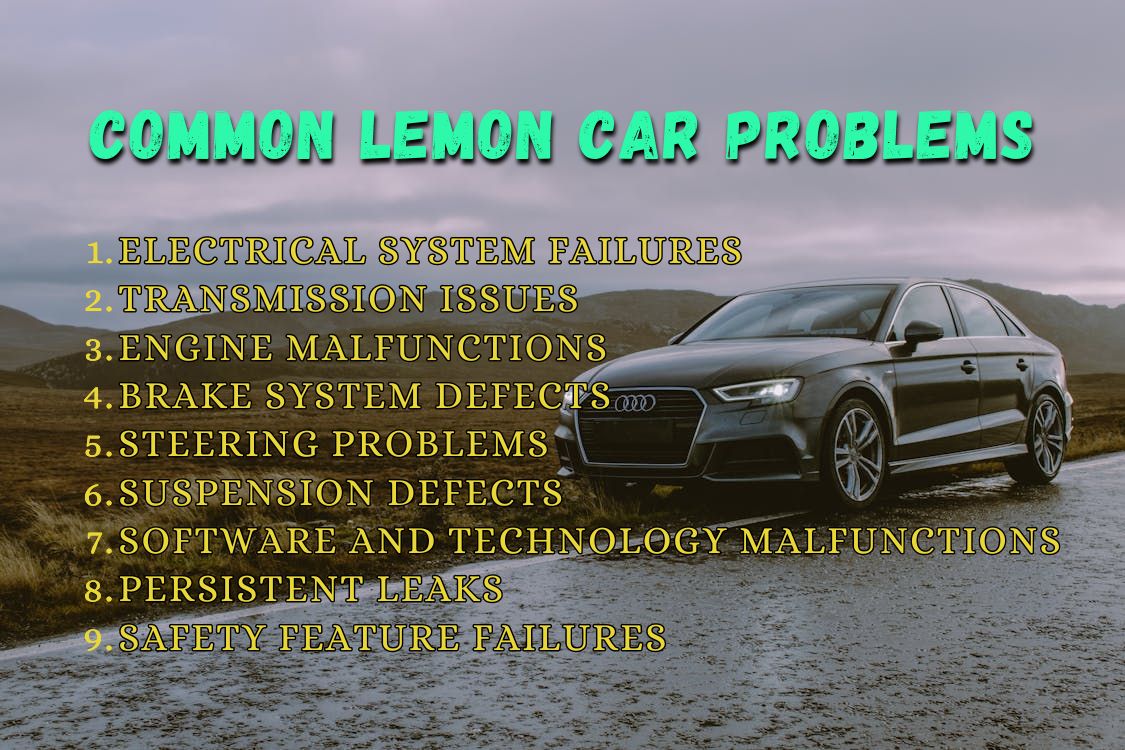
Common Lemon Car Problems
While any significant defect can potentially qualify a vehicle as a lemon, certain issues tend to crop up more frequently in Lemon Law cases. These problems typically affect the car’s core functionality, safety, or value. Here are some of the most common issues that may indicate you have a lemon:
- Electrical System Failures: This can include problems with the battery, alternator, or more complex electrical components that control various vehicle functions.
- Transmission Issues: Difficulties shifting gears, slipping transmission, or complete transmission failure are serious concerns that often qualify under Lemon Law.
- Engine Malfunctions: Persistent engine problems, such as stalling, misfiring, or loss of power, can significantly impact a vehicle’s performance and safety.
- Brake System Defects: Any issues with the braking system, including failure to engage properly or unusual noises, are critical safety concerns.
- Steering Problems: Difficulties in steering control or alignment issues that persist after multiple repair attempts may qualify.
- Suspension Defects: Abnormal bouncing, swaying, or noise from the suspension system can indicate serious problems.
- Software and Technology Malfunctions: In modern vehicles, persistent issues with infotainment systems, navigation, or other computer-controlled features can sometimes qualify.
- Persistent Leaks: Chronic fluid leaks, especially those involving engine oil or transmission fluid, can be indicative of serious underlying issues.
- Safety Feature Failures: Malfunctions in airbags, seat belts, or advanced driver assistance systems are particularly concerning.
Remember, for a problem to qualify under Lemon Law, it must be substantial and persist despite multiple repair attempts. The issue should also occur within the warranty period and significantly affect the vehicle’s use, value, or safety.
Is Lemon Law Only for New Cars?
Many people mistakenly believe that Lemon Law only applies to brand-new vehicles, but this isn’t the case in California. The state’s Lemon Law protection extends to both new and used vehicles, as long as they’re still covered by the manufacturer’s original warranty when the defect first appears.
Here’s what you need to know about Lemon Law coverage:
- New Vehicles: As expected, new cars, trucks, and SUVs are covered under the Lemon Law if they develop significant defects within the warranty period.
- Used Vehicles: If you’ve purchased a used car that’s still under the original manufacturer’s warranty, it’s also protected. This means many certified pre-owned vehicles may qualify.
- Leased Vehicles: The Lemon Law applies to leased cars as well, provided they’re leased for personal or family use.
- Other Vehicle Types: Beyond conventional passenger vehicles, the law also covers:
- Motorcycles
- Some recreational vehicles (RVs)
- The chassis and drivetrain of motorhomes
- Vehicle Size: The law covers vehicles under 10,000 pounds gross vehicle weight.
It’s important to note that the key factor is not the age of the vehicle or whether it’s new or used, but whether it’s still under the manufacturer’s original warranty when the problem first occurs. This means that even if you’ve bought a used car, you might be protected if serious issues arise while the original warranty is still active.
Understanding these nuances can help you determine if your vehicle might qualify under California’s Lemon Law. If you’re experiencing persistent problems with a warranted vehicle, whether new or used, it’s worth exploring your rights under this consumer protection law.
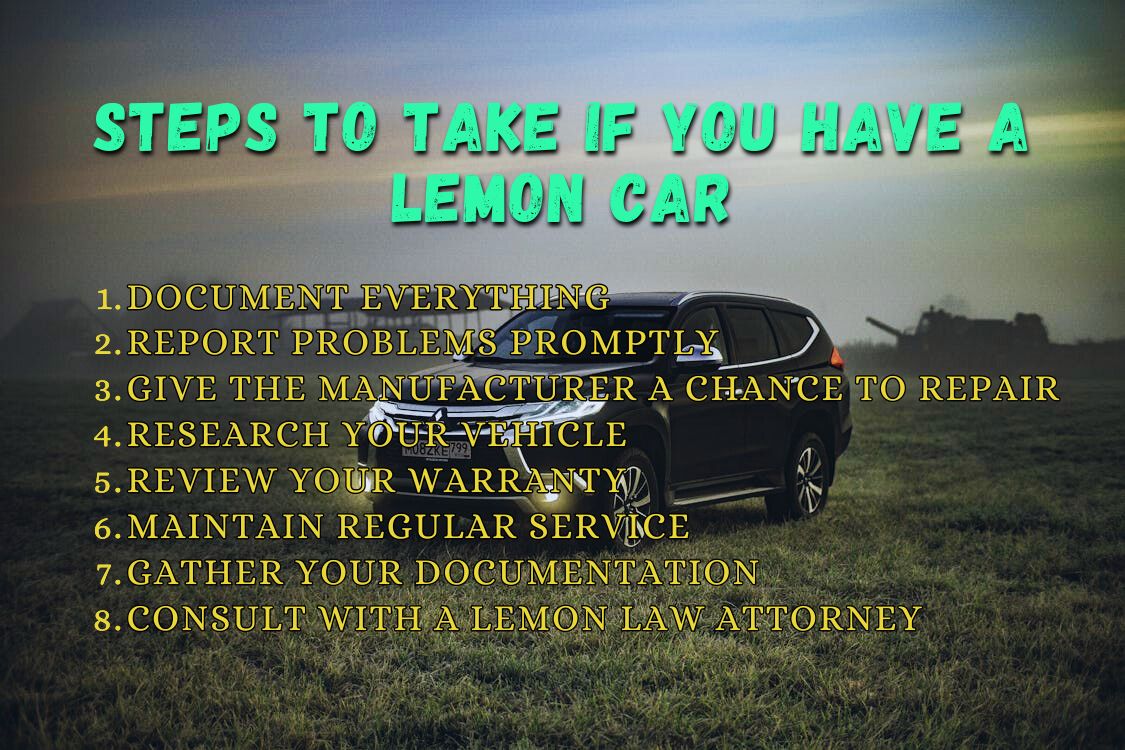
Steps to Take if You Have a Lemon Car
If you suspect you’ve purchased a lemon, taking the right steps can strengthen your case and increase your chances of a favorable resolution. Here’s what you should do:
- Document Everything:
- Keep detailed records of all repairs, including dates, descriptions of issues, and outcomes.
- Save all work orders, receipts, and correspondence with the dealership or manufacturer.
- Note any days your vehicle is out of service for repairs.
- Report Problems Promptly:
- Inform the dealership or manufacturer about issues as soon as they arise.
- Follow up on verbal communications with written notices for a paper trail.
- Give the Manufacturer a Chance to Repair:
- Allow the manufacturer a reasonable number of attempts to fix the problem.
- In California, this typically means at least four attempts for most issues, or two for safety-related problems.
- Research Your Vehicle:
- Look for similar complaints from other owners of your make and model.
- This information can help demonstrate a pattern of defects.
- Review Your Warranty:
- Understand what’s covered and for how long.
- Ensure your issue falls within the warranty period.
- Maintain Regular Service:
- Follow the manufacturer’s recommended maintenance schedule.
- This prevents the manufacturer from claiming neglect caused the problem.
- Gather Your Documentation:
- Compile all relevant paperwork, including your purchase agreement, warranty, repair orders, and correspondence.
- Consult with a Lemon Law Attorney:
- An experienced attorney can evaluate your case and guide you through the legal process.
- They can help negotiate with the manufacturer or represent you if legal action is necessary.
By following these steps, you’ll be well-prepared to pursue your rights under California’s Lemon Law. Remember, the key is to act promptly and maintain thorough records throughout the process.
Getting a Refund or Replacement
If your vehicle qualifies as a lemon under California law, you’re entitled to a remedy from the manufacturer. This typically comes in the form of either a refund or a replacement vehicle. Here’s what you need to know about these options:
Refund:
- The manufacturer must repurchase your vehicle at its original price.
- This includes reimbursement for the down payment, monthly payments, and payoff of any outstanding loan balance.
- You may also be entitled to related expenses such as registration fees, taxes, and costs for repairs and towing.
- The manufacturer can deduct a small amount for your use of the vehicle before problems began.
Replacement:
- You can receive a new vehicle of the same make and model.
- The replacement should be substantially identical to your original vehicle.
- Any difference in price due to options or upgrades should be adjusted accordingly.
Important points to remember:
- You have the right to choose between a refund or replacement.
- The manufacturer must also cover any incidental costs, like rental car fees or towing expenses.
- If you financed the vehicle, the manufacturer typically deals directly with the lender to pay off the loan.
- The process can take time, so patience is key.
The specific details of your refund or replacement can vary based on your situation. Factors like the vehicle’s age, mileage, and the nature of the defect can all play a role.
Navigating this process can be complex, especially when dealing with manufacturer representatives. That’s why many consumers find it beneficial to work with a knowledgeable Lemon Law attorney who can ensure they receive fair compensation.
Remember, the goal of California’s Lemon Law is to make you whole – to put you back in the financial position you were in before purchasing the defective vehicle. Don’t settle for less than what the law entitles you to receive.
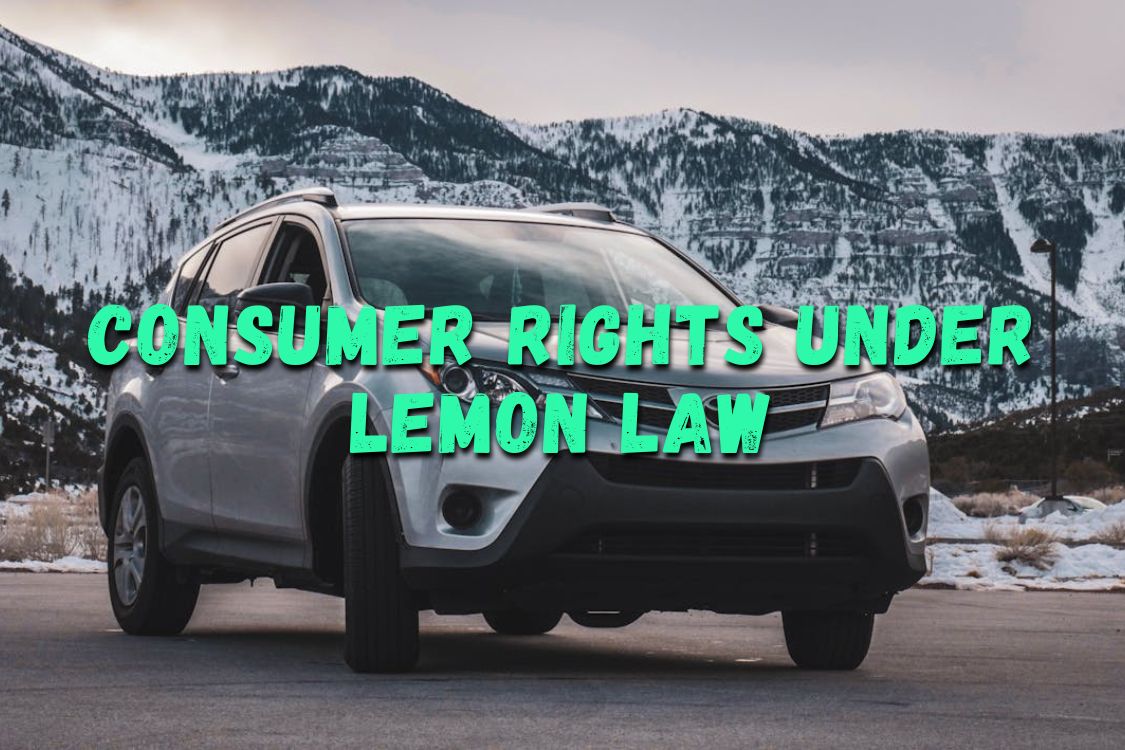
Consumer Rights Under Lemon Law
California’s Lemon Law provides strong protections for vehicle buyers. Understanding your rights under this law is crucial if you’re dealing with a persistently defective vehicle. Here are the key rights you should be aware of:
- Right to a Properly Functioning Vehicle: You’re entitled to a vehicle that operates as promised and meets quality standards.
- Right to Repair Attempts: The manufacturer must be given a reasonable opportunity to fix substantial defects.
- Right to Refund or Replacement: If repairs are unsuccessful, you can choose between a refund or a replacement vehicle.
- Right to Reimbursement: You can recover costs related to the defect, including repair expenses, towing fees, and rental car costs.
- Protection from Unfair Practices: Manufacturers cannot deny valid claims or use delay tactics to avoid their responsibilities.
- Right to Legal Representation: You can hire an attorney to help with your claim, and if successful, the manufacturer typically covers legal fees.
- Extended Protection Period: The protection period can be extended if repair attempts began within the original warranty timeframe.
- Right to Information: Manufacturers must provide clear information about the Lemon Law in the vehicle’s warranty booklet.
- Protection for Leased Vehicles: Lemon Law rights apply to leased vehicles as well as purchased ones.
- Right to Pursue Your Claim: You can take your case to arbitration or court if the manufacturer doesn’t offer a fair resolution.
These rights ensure that you’re not left bearing the financial burden of a defective vehicle. The law is designed to level the playing field between consumers and manufacturers, providing you with recourse when your vehicle doesn’t meet reasonable quality standards.
Remember, while these rights are guaranteed by law, effectively exercising them often requires persistence and thorough documentation. If you’re facing challenges with a potential lemon vehicle, understanding and asserting these rights can help you achieve a fair resolution.

Hiring a Lemon Law Attorney
While you can pursue a Lemon Law claim on your own, many consumers find that working with an experienced attorney significantly improves their chances of a favorable outcome. Here’s why you might consider hiring a Lemon Law attorney:
- Expertise in the Law: Lemon Law attorneys understand the nuances of California’s statutes and how to apply them to your case.
- Dealing with Manufacturers: Experienced attorneys know how to negotiate effectively with car manufacturers and their legal teams.
- Proper Documentation: An attorney can help ensure all necessary documentation is collected and presented correctly.
- Evaluating Your Case: They can assess the strength of your claim and advise on the best course of action.
- Representation in Arbitration or Court: If your case goes to arbitration or court, an attorney can represent your interests effectively.
- No Upfront Costs: Many Lemon Law attorneys work on a contingency basis, meaning you don’t pay unless you win your case.
- Maximizing Compensation: An attorney can help ensure you receive all the compensation you’re entitled to under the law.
- Saving Time and Stress: Handling the legal process allows you to focus on your daily life while your case progresses.
- Understanding Complex Cases: Some Lemon Law cases involve technical issues or unique circumstances that benefit from legal expertise.
- Manufacturer-Paid Fees: If your claim is successful, the manufacturer is typically required to pay your attorney’s fees.
When choosing a Lemon Law attorney, look for someone with specific experience in this area of law. Consider their track record, client reviews, and their approach to handling cases. Many attorneys offer free initial consultations, which can be a good opportunity to discuss your case and determine if they’re the right fit for you.
Remember, the goal is to resolve your Lemon Law claim efficiently and effectively. An experienced attorney can be a valuable ally in achieving this goal.
FAQs about Lemon Law
To help you better understand California’s Lemon Law, here are answers to some common questions:
Q: What qualifies as a substantial defect?
A: A substantial defect is one that significantly impairs the vehicle’s use, value, or safety. This could include major issues with the engine, transmission, brakes, or electrical system. Minor problems like slight rattles or cosmetic issues typically don’t qualify.
Q: Are used cars covered under Lemon Law?
A: Yes, used cars can be covered under California’s Lemon Law, provided they are still under the manufacturer’s original warranty when the defect first appears. This means many certified pre-owned vehicles may qualify for protection.
Q: How many repair attempts are considered reasonable?
A: In California, the number of “reasonable” repair attempts can vary based on the nature of the defect:
- For issues that could cause serious injury or death, two repair attempts may be enough.
- For other significant problems, four repair attempts are typically considered reasonable.
- Alternatively, if your car has been in the shop for a total of 30 days or more (not necessarily consecutive) for repairs, it may qualify as a lemon.
Q: Does Lemon Law apply to leased vehicles?
A: Yes, leased vehicles are covered under California’s Lemon Law, as long as they’re leased for personal or family use.
Q: Is there a time limit for filing a Lemon Law claim?
A: While there’s no strict deadline, it’s best to act quickly. The defect must have occurred within the warranty period, and claims are stronger when filed soon after problems arise.
Practical Tips for Consumers Dealing with Potential Lemon Vehicles
If you suspect you’ve purchased a lemon, these tips can help you navigate the process more effectively:
- Review Your Warranty Carefully: Familiarize yourself with your vehicle’s warranty terms. Ensure the problem you’re experiencing is covered and that you’re within the warranty period.
- Document Everything Meticulously:
- Keep all repair orders, invoices, and receipts
- Log each communication with the dealer or manufacturer
- Note dates your car is out of service for repairs
- Take photos or videos of the defect if possible
- Know California’s Lemon Law: Understand the specific requirements and protections offered by California’s Lemon Law. This knowledge can help you make informed decisions throughout the process.
- Act Promptly: Report problems to the manufacturer or dealer as soon as they occur. Delays can weaken your claim.
- Follow the Manufacturer’s Maintenance Schedule: Regular maintenance prevents the manufacturer from claiming neglect caused the issue.
- Be Persistent but Professional: Stay firm in pursuing your rights, but maintain a professional demeanor in all interactions.
- Consider Legal Assistance: If you’re struggling to resolve the issue, consult a Lemon Law attorney. Many offer free initial consultations to evaluate your case.
- Explore All Options: Understand the difference between a refund and a replacement vehicle, and consider which would be more beneficial for your situation.
- Prepare for Potential Arbitration: If your claim goes to arbitration, gather all relevant documents and prepare a clear, concise presentation of your case.
- Stay Informed: Keep up with any updates or changes to California’s Lemon Law that might affect your case.
By following these tips, you’ll be better prepared to handle potential lemon vehicle issues and protect your rights as a consumer under California law.
Key Factors to Consider in a Potential Lemon Law Case
When evaluating whether you have a valid Lemon Law claim, consider these important factors:
- Vehicle History and Common Issues:
- Study your owner’s manual thoroughly
- Research consumer reports and forums for known problems with your vehicle model
- This information can help you identify if your issue is a common defect
- Manufacturer and Dealership Reputation:
- Check the Better Business Bureau ratings for both the manufacturer and the dealership
- Look for patterns of complaints or unresolved issues that might indicate a systemic problem
- Warranty Coverage:
- Review your vehicle’s express warranty carefully
- Ensure that the specific defect you’re experiencing is covered under the terms of the warranty
- Note the warranty’s duration and mileage limits
- Repair Attempts and Documentation:
- Keep a detailed log of all repair attempts, including dates and descriptions
- Collect and organize all repair orders, invoices, and communications with the dealer or manufacturer
- Time and Mileage Considerations:
- Be aware of how long you’ve owned the vehicle and its current mileage
- Remember that Lemon Law claims typically must be filed within a certain timeframe or mileage limit
- Impact on Vehicle Use and Value:
- Consider how the defect affects your ability to use the vehicle safely
- Assess any impact on the vehicle’s resale value
- California’s Arbitration Program:
- Understand that California offers a state-certified arbitration program for Lemon Law disputes
- Consider whether arbitration might be a good option for resolving your case
- Legal Representation:
- Evaluate whether your case might benefit from the expertise of a Lemon Law attorney
- Many attorneys offer free consultations to assess the strength of your claim
By carefully considering these factors, you can better assess the strength of your potential Lemon Law case and determine the most appropriate course of action.

Understanding California’s Lemon Law Arbitration Program
California offers a state-certified arbitration program as an alternative to court for resolving Lemon Law disputes. Here’s what you need to know:
- Definition:
- Arbitration is a process where an independent third party (the arbitrator) reviews evidence from both the consumer and the manufacturer to make a binding decision.
- Eligibility:
- Available for both new and used vehicles covered under the original manufacturer’s warranty
- Typically used when direct negotiations with the manufacturer have been unsuccessful
- Process:
- You submit a claim describing your vehicle’s issues and repair history
- The manufacturer responds to your claim
- An arbitration hearing is scheduled, usually within 40 days of your application
- Both parties present their case to the arbitrator
- The arbitrator makes a decision, typically within 10 days of the hearing
- Advantages:
- Often faster than going to court
- Less formal and typically less expensive than litigation
- You can still go to court if you’re unsatisfied with the arbitration result
- Potential Outcomes:
- Vehicle repurchase or replacement
- Reimbursement for repairs
- Extension of the vehicle’s warranty
- Determination that the vehicle doesn’t qualify as a lemon
- Preparation:
- Gather all relevant documentation, including repair orders and correspondence
- Be prepared to clearly explain your vehicle’s issues and how they impact its use, value, or safety
- Representation:
- You can represent yourself or have an attorney represent you
- Manufacturers often have legal representation at arbitration hearings
While arbitration can be an effective way to resolve your Lemon Law claim, it’s important to understand the process and be well-prepared. Consider consulting with a Lemon Law attorney to determine if arbitration is the best option for your specific case.
Identifying Substantial Defects and Maintaining Proper Documentation
In Lemon Law cases, understanding what constitutes a substantial defect and keeping thorough records are crucial. Here’s what you need to know:
Substantial Defects:
A substantial defect is a problem that significantly impacts your vehicle’s:
- Use: Issues that prevent you from using the car as intended
- Value: Problems that substantially decrease the vehicle’s market value
- Safety: Defects that put you, your passengers, or other road users at risk
Examples of substantial defects may include:
- Engine failures or persistent mechanical issues
- Faulty transmission
- Malfunctioning brakes or steering
- Persistent electrical system problems
- Severe and recurring water leaks
Proper Documentation:
To build a strong Lemon Law case, maintain detailed records of:
- Repair Attempts:
- Dates of each repair visit
- Detailed description of the problem(s)
- Work performed by the dealership
- Length of time the vehicle was in the shop
- Communications:
- Keep copies of all written correspondence with the dealer and manufacturer
- Log details of phone conversations, including dates, times, and who you spoke with
- Vehicle Information:
- Purchase or lease agreement
- Warranty information
- Vehicle identification number (VIN)
- Personal Records:
- Notes on how the defect affects your daily life
- Any out-of-pocket expenses related to the defect (e.g., towing costs, rental cars)
- Photos and Videos:
- If possible, document the defect visually
The more comprehensive your documentation, the stronger your Lemon Law claim will be. This evidence is essential whether you’re negotiating directly with the manufacturer, going through arbitration, or pursuing legal action. If you’re unsure about what qualifies as a substantial defect or how to properly document your case, consider consulting with a Lemon Law attorney for guidance.
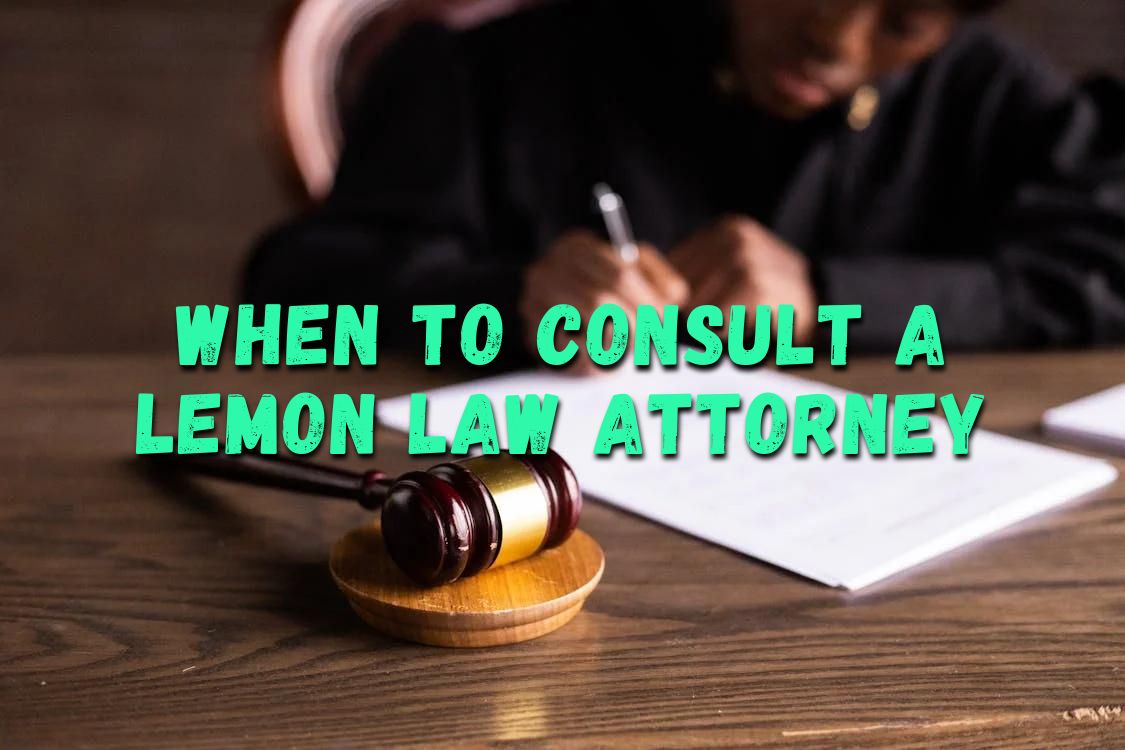
When to Consult a Lemon Law Attorney
If you suspect you’ve purchased a lemon vehicle, seeking advice from an experienced Lemon Law attorney can be crucial. Here’s why and when you should consider legal representation:
- Early Case Evaluation:
- An attorney can assess whether your vehicle qualifies under California’s Lemon Law
- They can advise on the strength of your case and potential outcomes
- Expertise in California Lemon Law:
- Lemon Law attorneys specialize in the nuances of California’s specific regulations
- They stay updated on any changes or new interpretations of the law
- Dealing with Manufacturers:
- Attorneys have experience negotiating with car manufacturers and their legal teams
- They can level the playing field, ensuring your rights are protected
- Proper Documentation:
- A lawyer can guide you on what documentation is crucial for your case
- They can help organize and present your evidence effectively
- Navigating Complex Procedures:
- Lemon Law cases can involve intricate legal procedures
- An attorney can handle these complexities, allowing you to focus on your daily life
- Maximizing Compensation:
- Experienced attorneys know how to calculate and pursue full compensation under the law
- This includes not just the vehicle cost, but also related expenses
- Representation in Arbitration or Court:
- If your case goes to arbitration or court, having legal representation can significantly improve your chances of a favorable outcome
- No Upfront Costs:
- Many Lemon Law attorneys work on a contingency basis, meaning you don’t pay unless you win
- Time-Sensitive Matters:
- Attorneys understand the time limits involved and can ensure your claim is filed promptly
While not every case requires an attorney, consulting one can provide valuable insights into your situation. Many Lemon Law attorneys offer free initial consultations, allowing you to discuss your case and understand your options without obligation. If you’re struggling with a potentially defective vehicle, reaching out to a knowledgeable Lemon Law attorney can be a wise step in protecting your rights and seeking a fair resolution.
Consumer Remedies: Your Options Under Lemon Law
If your vehicle qualifies as a lemon under California law, you’re entitled to either a refund or a replacement:
- Refund:
- Full reimbursement of the vehicle’s purchase price
- Includes down payment, monthly payments, and payoff of any remaining loan balance
- Compensation for related expenses like repairs, towing, and rental cars
- A small deduction may be made for your use of the vehicle before problems began
- Replacement:
- A new vehicle of the same make and model
- Should be substantially identical to your original vehicle
You have the right to choose between these options. The manufacturer must honor your preference and cannot force you to accept one over the other. Remember, the goal is to make you whole and put you back in the position you were in before purchasing the defective vehicle.
Advanced Strategies for Lemon Law Claims
- Document Meticulously:
- Keep a detailed log of all issues, repair attempts, and communications
- Save all receipts, work orders, and correspondence
- Master Negotiation:
- Be firm but professional when dealing with manufacturers
- Know your rights and the law’s specifics to negotiate effectively
- Leverage Consumer Resources:
- Utilize consumer advocacy groups for support and information
- Research similar cases to understand common outcomes
- Stay Informed:
- Keep up with any changes in California’s Lemon Law
- Understand the manufacturer’s obligations under the law
- Be Persistent:
- Follow up regularly on your claim’s progress
- Don’t be discouraged by initial rejections or delays
These strategies can strengthen your claim and improve your chances of a favorable resolution under California’s Lemon Law.
Taking Action: Your Path to Resolution Under California’s Lemon Law
Dealing with a defective vehicle can be frustrating, but California’s Lemon Law provides a path to justice. Here’s what to remember:
- Act Promptly: Document issues and repair attempts as they occur.
- Know Your Rights: Familiarize yourself with California’s Lemon Law protections.
- Communicate Clearly: Keep the manufacturer informed about ongoing problems.
- Seek Professional Guidance: Consider consulting a Lemon Law attorney for expert advice.
- Persist in Your Claim: Don’t give up if you face initial resistance.
- Understand Your Options: Know the differences between refunds and replacements.
- Prepare for Resolution: Whether through negotiation, arbitration, or court, be ready to present your case.
At Consumer Action Law Group, we’re committed to helping California consumers navigate Lemon Law claims. If you’re struggling with a potential lemon vehicle, don’t face it alone. Reach out to us for a free consultation. We’ll evaluate your case, explain your options, and guide you towards the best possible outcome.
Remember, the law is on your side. With the right approach and support, you can turn a lemon situation into a fair resolution. Take the first step today towards reclaiming your rights as a consumer.












